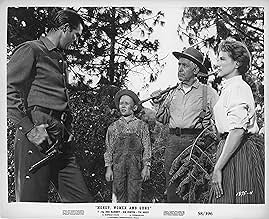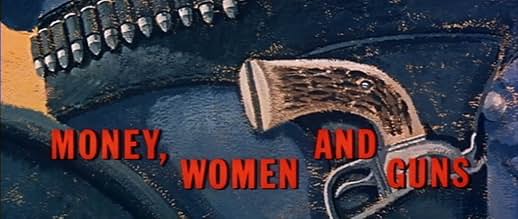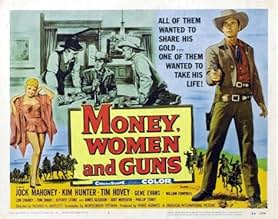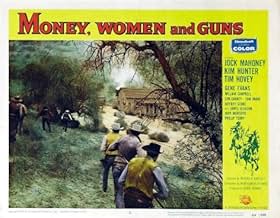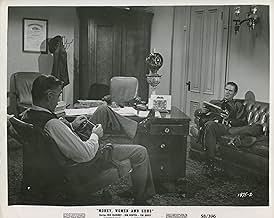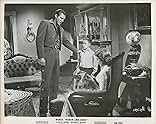IMDb-BEWERTUNG
6,2/10
452
IHRE BEWERTUNG
Ein alter Goldsucher wird überfallen und stirbt, kann vorher aber noch sein Testament aufschreiben. Daraufhin sucht Detektiv Hogan die genannten Erben auf und bemüht sich gleichzeitig, den u... Alles lesenEin alter Goldsucher wird überfallen und stirbt, kann vorher aber noch sein Testament aufschreiben. Daraufhin sucht Detektiv Hogan die genannten Erben auf und bemüht sich gleichzeitig, den unbekannten Mörder zu identifizieren.Ein alter Goldsucher wird überfallen und stirbt, kann vorher aber noch sein Testament aufschreiben. Daraufhin sucht Detektiv Hogan die genannten Erben auf und bemüht sich gleichzeitig, den unbekannten Mörder zu identifizieren.
Lon Chaney Jr.
- Art Birdwell
- (as Lon Chaney)
Judi Meredith
- Sally Gunston
- (as Judy Meredith)
Rodney Bell
- Martin
- (Nicht genannt)
Jack Daly
- Livery Stable Man
- (Nicht genannt)
Steve Darrell
- Sheriff Madsen
- (Nicht genannt)
Franklyn Farnum
- Postmaster
- (Nicht genannt)
Empfohlene Bewertungen
The title itself just about sums up Hollywood film production. Kidding aside, this Western's got a number of nice touches, and with a more involved director (Bartlett) and dynamic lead (Mahoney), could have gelled into a genuine sleeper.
It's got an unusual mystery premise for a Western— detective Hogan has to figure out which beneficiary killed the wealthy old miner— as well as a cast of former A-players— Chaney, Drake, Evans, Gleason, and Terry. But especially, there's Kim Hunter who only a few years earlier picked up a heavyweight Oscar for A Streetcar Named Desire (1951).
I suspect it's a better than the average B-production because of studio (Universal) backing. That backing leads to some scenic locations, fine color photography, and the supporting cast of familiar faces. Also, the unconventional script contains some nice ironies, along with a few surprises. In fact, calling this a pacifist Western may not be too much of a stretch.
Mahoney certainly looks the part of a Western hero, but unfortunately more or less walks through his part in a perfectly tailored outfit. Then too, director Bartlett does nothing to draw us further into the story-- as a result, we remain on the outside, looking in. Anyway, it remains a Western of fine visuals with an unusual storyline, despite the two central drawbacks.
It's got an unusual mystery premise for a Western— detective Hogan has to figure out which beneficiary killed the wealthy old miner— as well as a cast of former A-players— Chaney, Drake, Evans, Gleason, and Terry. But especially, there's Kim Hunter who only a few years earlier picked up a heavyweight Oscar for A Streetcar Named Desire (1951).
I suspect it's a better than the average B-production because of studio (Universal) backing. That backing leads to some scenic locations, fine color photography, and the supporting cast of familiar faces. Also, the unconventional script contains some nice ironies, along with a few surprises. In fact, calling this a pacifist Western may not be too much of a stretch.
Mahoney certainly looks the part of a Western hero, but unfortunately more or less walks through his part in a perfectly tailored outfit. Then too, director Bartlett does nothing to draw us further into the story-- as a result, we remain on the outside, looking in. Anyway, it remains a Western of fine visuals with an unusual storyline, despite the two central drawbacks.
Money, Women and Guns is directed by Richard H. Bartlett and written by Montgomery Pittman. It stars Jock Mahoney, Kim Hunter, Tim Hovey, Gene Evans, Tom Drake and Lon Chaney Jr. Music is by Joseph Gershenson and CinemaScope photography is by Philip Lathrop.
A strange bag of oats is this one. The makers have offered up CinemaScope and parked up at Lone Pine to film it. The colour lensing is beautiful, while the story has promise unbound, yet it still struggles to come out in credit.
Story sees an old prospector murdered at pic's start (we don't see who done the deed), so in comes detective Silver Ward Hogan (Mahoney). Hogan sets out to find the killer and also an heir to the dead man's fortune.
And thus we have a sort of Hercule Poirot in the Wild West. Which is fun, and the mystery element is engaging and constantly strong. Yet the Scope potential is barely utilised, action is in short supply, and the acting performances - whilst adequate - reek of easy paycheck time.
Not a waste of time by any stretch of the imagination, but it sure as hell is frustrating. 6/10
A strange bag of oats is this one. The makers have offered up CinemaScope and parked up at Lone Pine to film it. The colour lensing is beautiful, while the story has promise unbound, yet it still struggles to come out in credit.
Story sees an old prospector murdered at pic's start (we don't see who done the deed), so in comes detective Silver Ward Hogan (Mahoney). Hogan sets out to find the killer and also an heir to the dead man's fortune.
And thus we have a sort of Hercule Poirot in the Wild West. Which is fun, and the mystery element is engaging and constantly strong. Yet the Scope potential is barely utilised, action is in short supply, and the acting performances - whilst adequate - reek of easy paycheck time.
Not a waste of time by any stretch of the imagination, but it sure as hell is frustrating. 6/10
This film is very unexpected. Almost from the beginning it just does not seem like a western and it really is not. It's a first rate drama that just happens to have a western setting. There's no gun shooting, no chases, no brawls - but there is serious dialogue that grips you immediately. The story is also very unusual, hardly the kind of matinée western Universal was famous for. But through all of it Jock Mahoney is absolutely luminous he is so handsome, dashing, and sexy. You just cannot take your eyes off him. Kim Hunter, the woman Jock falls for is a perfect foil for him. He is interested right away but the idea of settling down is more than he can take. What happens and how it happens is a delightful surprise.
This was a fair western but Jock and Tim Hovey worked well together. He finally got his chance to show his stuff. Actually, my mom's favorite western was "Slim Carter" about a man changing his ways over a kid. Mr. Mahoney was in a lot of movies but for a long time you never saw his face, just his riding skill on a white horse. Eventually he was shown as a Texas Ranger chasing the Durango Kid over rooftops and finally jumping off a roof onto the white horse. Part of the time Jock was literally chasing himself. My favorite DK series was "Bandits of El Dorado". There were so many well known names..John Dehner,Fred Sears, Lewis, and of course...Clayton Moore, whose voice I recognized instantly as the future Lone Ranger. In the movie of this subject, Jock looked like a powerful man, large shoulders small waist, and could ride a horse like he was part of it. Thanks for letting me share.
This would have been a "prestige" western at the time, in color and Cinemascope, with recognizable stars. It keeps your interest despite the many broken promises.
First of all, the Cinemascope lens was plopped down on soundstages, wasting the panorama. The title is misleading. "Money" figures in the plot, granted. But I counted only two "Women." Neither projected the woman in the lobby poster (a soiled dove stripped down to her skivvies), being, instead, hardy frontier stock. And "Guns" suggests action that never really materializes.
Jock Mahoney was a legendary stuntman. He was pushing 40 by the time of this production, but still had a couple Tarzan roles in his future. You can see effortless grace in his movement, apparently weightless. Horseback, Mahoney appears to glide across the prairie hovering above his pounding steed. Mahoney's fight choreography was unsurpassed until the Hong Kong kung fu school a generation later. The script and direction simply declined to tap the resource. The fashion in westerns by the late '50s had shifted from action to the talk-burdened, angsty "psychological western."
In the early '50s there was a glut of syndicated half-hour westerns to fill the maw of local programming until networks could supply their own content. These were unabashed orgies of fistfight, shoot-out and horseplay (I mean on horses), with surprising amounts of plot - and absolutely no suspense: the hero brought the bad guy to justice. Within their formula, these actioners were brilliant catalogs of stunt work. They far surpassed the action scenes in big budget big screen productions. (John Wayne, just for example, was a lousy stage fighter. He had this big roundhouse right that took forever to land. Hey, bad guy! Move out of the way! Duck and land a couple uppercuts before that punch completes its orbit!)
Jock Mahoney as "The Range Rider" was hands-down the greatest of the syndicated cowboys. Simply mounting and dismounting were done with gymnastic flourish - even holstering his gun. No runaway stage went unboarded. No picket fence went unhurdled. No stick of furniture in a brawl went unsmashed. No monolithic boulder went unjumped up on or down from. These shows were the bridge between the astonishing physicality of the silent movie comedians and the flying fists of the chop-saki masters.
By the late '50s, oaters dominated network primetime. They strove to stand out from each other by issuing odd weaponry, or creating weird hybrids: the urbane western, the spy western, the jazz western. (Nobody thought to bring back the singing cowboy.)
"Money, Women and Guns" feels a lot like a pilot for a TV series. The story plays out episodically as our hero tracks down suspects in the murder of a rich old prospector. The suspects are also the beneficiaries of his will. We learn how the suspects were associated with the dead man. (Sort of a sagebrush "Citizen Kane".) Mahoney plays "Silver" Ward Hogan, a self-described "detective", not a bounty hunter or territorial marshal. Indeed, Hogan owes as much to Joe Friday as the Lone Ranger. The story is carried by the mystery. It also has some of the quality of "Law & Order" in that the first character suspected is never the murderer-unless, of course, the investigation circles back to him. I'm not saying it does or doesn't.
Wusstest du schon
- WissenswertesLon Chaney Jr's last film for "Universal."
- PatzerIn an early scene, if you keep an eye on Ben Merriweather as he scrawls out his dying note, there's no way his erratic, shaking hand could have produced anything legible.
- SoundtracksLonely Is The Hunter
Composed and Sung by Jimmy Wakely
Top-Auswahl
Melde dich zum Bewerten an und greife auf die Watchlist für personalisierte Empfehlungen zu.
Details
- Laufzeit
- 1 Std. 20 Min.(80 min)
- Seitenverhältnis
- 2.35 : 1
Zu dieser Seite beitragen
Bearbeitung vorschlagen oder fehlenden Inhalt hinzufügen


